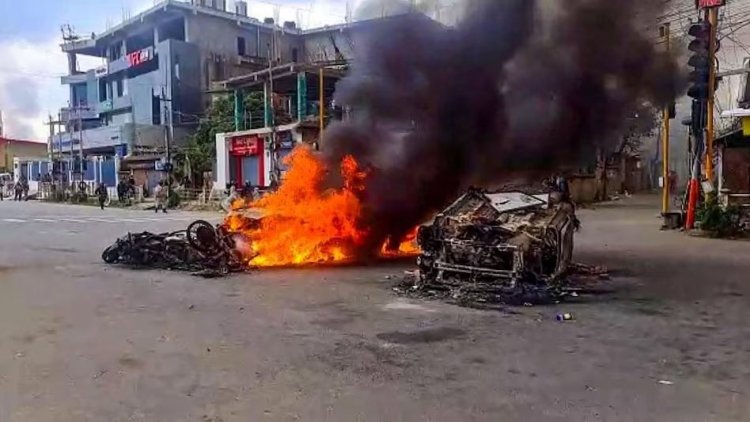Manipur: Still Tense
Asia News Agency

Manipur has remained tense after two houses were torched last week. Incidents of violence had left at least 70 people dead in ethnic violence since May 3.
Sit-in demonstrations, mostly by the womenfolk, were reported in the valley districts, with the agitators demanding that the Suspension of Operation (SoO) with Kuki militants be abrogated and action be taken against them. They also demanded that "illegal Myanmarese immigrants" be deported, poppy cultivation be stopped in the hill areas and also protested the hill MLAs' demand for bifurcation of the State.
Around 10,000 Army and Assam Rifles jawans are currently deployed in the State. Security forces are conducting aerial surveillance by unmanned aerial vehicles and Cheetah helicopters.
Internet services remain suspended since violence started in order to stop rumours and hate messages from being spread. However, it is alleged that the warring Meitei and Kuki community people living outside the State are spreading hatred in their social media posts.
Background: Clashes broke out in Manipur after a 'Tribal Solidarity March' was organised in the hill districts on May 3 to protest against the Meitei community's demand for Scheduled Tribe (ST) status.
The violence in Manipur was preceded by tension over the eviction of Kuki villagers from reserve forest land, which had led to a series of smaller agitations.
Meiteis account for about 53% of Manipur's population and live mostly in the Imphal Valley. Tribals — Nagas and Kukis — constitute another 40% of the population and reside in the hill districts.
Losing sight of what's really important
Meanwhile, the Supreme Court hearings continue on a slew of petitions seeking the top court’s intervention in the Manipur violence and issues related to the demand for ST (Scheduled Tribe) status by a section of Meiteis. These echo concerns of Manipur’s tribal people on the issue of violence committed on hill tribes of the state.
No link with poppy cultivation: Mercy V. Guite (teaches Literature and Culture Studies in JNU) and Mercy K. Khaute (teaches at the Faculty of Law, University of Delhi) point out that the petitions filed by the hill tribes seek to condemn the inhuman acts of violence conducted against the Kuki-Zomi community in Imphal as reports and evidence of the involvement of the Arambai Tenggol and Meitei Leepun miscreants in burning houses, churches and educational institutions and killing many innocent civilians belonging to the Kuki-Zomi tribe have emerged. However, the respondents claim that the violence resulted due to the influx of ‘illegal immigrants’ and poppy cultivation in the reserved forests.
This is appalling, write the two authors “as the legal hearings have nothing to do with any discussions on who an immigrant is or which cultivation leads to what ordeal….
“The debate on ‘illegal migrants’ is insignificant when the facts deal with inhuman acts of violence against a particular section of people in the state who are neither immigrants nor ‘illegal migrants’ from Myanmar…..
“The fundamental issue here is of lives lost, crimes against humanity being committed by targeting a particular community, houses and places of worship being burnt down. Instead, there is a tendency among a section of people to conveniently frame the entire tribal community as perpetrators of violence simply because their past was filled with battles defending their land and identity. The need of the hour is to give justice where it is due.”















